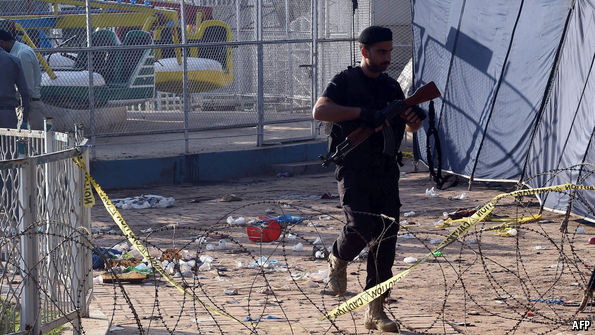
MEMBERS of Pakistan’s confidence investiture who are charged with gripping sequence in Punjab, a country’s biggest province, have in new weeks trumpeted their successes opposite eremite militancy and extremism. Entire groups had been “eliminated”, comparison troops officers positive reporters recently. That explain was sorely tested by an slaughter in Lahore, a collateral of Punjab, on Mar 27th.
A suicide-bomber blew himself adult during a little entertainment park where families had been enjoying a pleasing primary evening. At slightest 72 people were killed, many of them women and children, and some-more than 200 injured. It was substantially no fluke that many of a victims were from Pakistan’s little Christian minority, who had left out to applaud with their families after attending Easter Sunday church services. A breakaway faction, Jamaat ul-Ahrar, of Tehreek-e-Taliban Pakistan or a Pakistani Taliban, claimed responsibility. “We have entered Lahore,” it crowed.
Punjab
Massacres of civilians are sadly common in Pakistan, though not in Punjab. Lahore, a hometown of a primary minister, Nawaz Sharif, is routinely peaceable. Many from Pakistan’s municipal and troops elites accost from Lahore or other tools of Punjab, a range of 110m and a country’s many influential. Lahore has usually ever suffered a fragment of a assault that terrorists have rained down on a north-western city of Peshawar, for example, and a circuitously genealogical belt along a limit with Afghanistan.
The blast therefore outlines a serve escalation in Pakistan’s conflict opposite extremism. In a past Mr Sharif’s statute Pakistan Muslim League-Nawaz (PML-N) has been suspected of distinguished deals with several narrow-minded jihadist outfits handling out of Punjab, quite in a south of a range nearby a Indian border. Some of Pakistan’s apprehension groups had for years been nurtured by tools of a army, that found them useful in agitating in Afghanistan and opposite India. But in Jun 2014 Pakistan’s army changed opposite a Pakistani Taliban’s sanctuaries adjacent Afghanistan, heading to a thespian tumble in violence. The debate was stretched into an desirous “national movement plan” opposite extremism, following a electrocute in Dec 2014 of around 130 schoolchildren in Peshawar. More than anything, that electrocute assured many Pakistanis that a apprehension fostered in their midst indispensable to be confronted.
The extremists will not go quietly. On a same day as a Lahore bombing, meaningful protests took place in Islamabad, a Pakistani capital. There tens of thousands collected to remember Mumtaz Qadri, a former troops bodyguard who in 2011 gunned down his charge, Salman Taseer, a administrator of Punjab. Qadri pronounced he had killed a liberal-minded Taseer since of a governor’s position opposite a country’s oppressive heresy laws. He was hanged for a corruption in late February. His supporters sojourn angry. Several hundred fought past troops banishment rip gas and set adult stay outward Parliament. Along a approach they torched new train stations built during outrageous responsibility as partial of a supervision infrastructure project. An public of radicals proceeded to emanate a array of demands, including a evident deception of sharia law. The protests in Islamabad were unfriendly with a destruction in Lahore. But both events underscore a grave certainty: now that he is holding a quarrel to Pakistan’s eremite right, Mr Sharif can be certain that it will quarrel back.